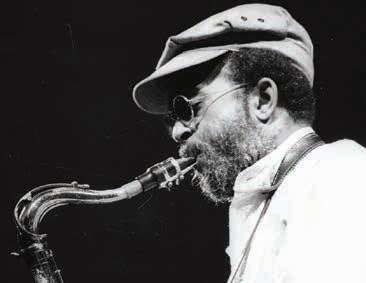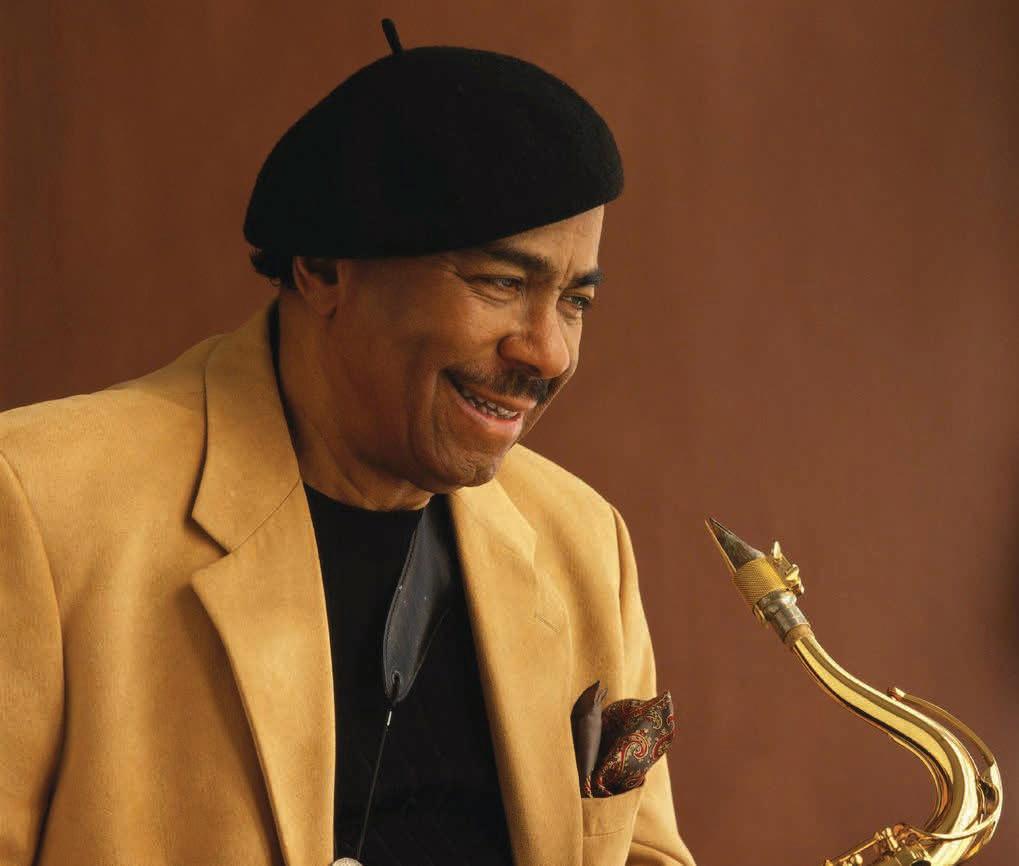
9 minute read
Rodney Whitaker by Alvin Carter Bey
American Jazz Bassist, Composer, Educator RODNEY WHITAKER
Rodney Whitaker was born on February 22, 1968, in Detroit, Michigan
Rodney Whitaker interview by Alvin Carter-Bey on May 24, 2015.
ACB: I have a great guy on line with me. He is a beautiful man. I must ask him if he run track because he has a great bass line that will knock you out! Hey. Rodney Whitaker, welcome to Jazz Rap here at WHPK. RW: Thanks for having me, Al. I’ve been looking forward to talking to you. ACB: Oh, man, the last time we talked, as you said, it was a cool day, right? RW: Oh, yeah. It’s a little bit warmer now. ACB: For those fans that might not recognize you, Rodney Whitaker was the great bassist with Houston Person at our event in Lakeside, Michigan, three years ago. RW: Oh, yeah. ACB: And he had everybody booming off their seat. Rodney Whitaker is a renowned bass player, known throughout the world. He’s a Professor of Jazz at Michigan State University. So, this cat has a rich background. Rodney, tell me what’s been going on. RW: Well, I’ve been promoting my new record, When We Find Ourselves Alone (Mack Avenue Records, 2014). Then, I play as much as possible. This record was important to me because it was my way of introducing my daughter to the jazz scene and the world. We had a good time and maybe we’ll be at the Showcase or the Green Mill playing. That’s been my focus, these days. ACB: Is this your daughter’s first recording? RW: Yeah, and it was nice that I was able to be a part of her first recording. ACB: She does a great job on Mister Magic. RW: Oh, yeah, she loved that and it was her first take in the studio. She nailed it on the first take. We did two more takes and we liked the first one. So, it was a great experience. ACB: What do you think of your family member being a part of what you do? RW: I didn’t grow up in a musical family but I have one, now, because my wife is a musician. She composes and directs a choir. All of my children sing and play. So, it’s a family affair and we play together. One daughter is a singer and songwriter. Another daughter is a drummer. I’ve got a son that plays guitar. And a couple of bass players. So, this is a musical family and we all sing, although my singing is not very good. But we won’t go there. ACB: What interesting things do you tell them to encourage them to play American Classical Music, Jazz? RW: If you grow up in it, you know. For my kids, jazz is a way of life. On any given day, Wynton Marsalis could be in our house. They had lunch with Johnny Griffin and Dianne Reeves at the house. That’s a normal part of music. They grew up knowing all the musicians and having an opportunity to hang and be a part of that whole thing. So, they love the music. All of them don’t play jazz. Two play rock and folk music. But they love jazz. It’s on their iPod. I can’t believe it, sometimes. I’ll walk into the kitchen and the kids are at the house, hanging, and listening to jazz. Even when I ain’t there, they’re digging it. So, it’s a part of their life. I don’t think they think of it as something special. It’s just music. ACB: We’re talking to one of the hardest working bass men or I should say great musical artists Mr. Rodney Whitaker. Were you a long-distance runner? I have to ask bass players that because 1’ve heard your music and you really be hitting. I mean, you really be booming it. You are keeping up with what you’ve got to work with, man. Seems like it’s a hard job and you’ve got to have a lot of energy. So, were you a long-distance runner? RW: Well, you know, I used to play football. Growing up, I was a football player. ACB: Okay. RW: My specialty was defense. You’re chasing folks around the field. That work ethic paid off and
certainly helps my music. There is a heavy legacy for bass players from Detroit and a great responsibility. But being from Detroit and a bass player is about survival. I was telling some young folks yesterday that this music is about survival. It helped me survive turbulent times. A lot of folks that I grew up with in my neighborhood didn’t make it this far. Music put me on another path but it was about survival, also. I attack the bass with vengeance, you know. I come at it with everything I’ve got. I taught me a lot about music, style, and dressing up for the gig. When I first went on the road with those guys, I was country, man. I didn’t want to spend money on clothes. Those guys were sharp dressers and they would shame you. Fortunately, it grew on me and I had the chance to play. This was my first road gig with Donald, Terence, Carl Allen, and Cyrus Chestnut. They were a little bit older than me and they took me under their wings and schooled me about learning music, being they get up on stage to perform. RW: My father-in-law was a blues musician and he believed that you were supposed to look better than the people in the audience. You had to give them something to aspire to. And Chicago, shoot, it’s a good thing I don’t live here, man. I wouldn’t have no money. I’d be shopping all the time. ACB: You did stints with Kenny Burrell, Cyrus, Eric Reed, and a few others. How long were you with Kenny Burrell? RW: Well, I really wasn’t with him but


play from my soul and my spirit. I’m in love with playing the bass. It’s my passion. ACB: And trust me, Rodney, you hit well. You had a lot of applause from people here in Chicago who remembered your playing and thought you were excellent. RW: Thank you. ACB: You did a stint with Donald Harrison and Terence Blanchard. How were those sets? RW: That was my first road gig. I was 20 years old and they were great mentors, Terence and Donald. They serious about being a musician, and dressing sharp, man. You’ve got to project. I’ve learned from Carl and Terrance and all those guys that, if you look like you don’t have no money, nobody’s ever going to pay you any money. They looked good. I started buying fancy watches and nice clothes and all that. They started that addiction. ACB: I heard Art Blakey say that you’re seen before you’re heard. RW: Oh, yeah. ACB: In Chicago and some other places, cats don’t care what they look like when 61
I played some shows with him, over the years, in Detroit, New York, and around the world. But freelancing. When I left Roy Hargrove’s group, I freelanced for a couple of years. Then, I got the gig with Wynton Marsalis. After leaving his band, I freelanced. I had my own group and I play with whoever called. So, I got a chance to play with him a lot, over the years. I was with the Detroit Jazz All-Stars. I was fortunate to be in that group. Kenny Burrell worked with that group, sometimes. Usually, it was Hank Jones, Tommy
Flanagan, or Geri Allen on piano. Louis Hayes played drums and I was fortunate to be the bass player. We had Charles McPherson, Curtis Fuller, and Marcus Belgrave, who passed away, today. ACB: Yeah, I’m sad about that. RW: Frank Foster would play. He’s not from Detroit but he spent the last year of high school there and he went to Wayne State. So, he considers himself a Detroiter. I got to be the young guy in a band with those greats. I played with those Detroit giants, plus the great Kenny Burrell, who I in November. He told me how proud he was of what I was doing with the school. ACB: So, what high school did you go to in Detroit? RW: I went to Martin Luther King High School. I didn’t go to Cass Tech. ACB: Okay. RW: Although I’m listed as one of the 300 top musicians from Cass Tech, I didn’t go there. I tell people I did not go to Cass Tech but I am listed in the Alumni. They just claimed me. ACB: Here in Chicago, we talk about DuSable High School. RW: Oh, yeah, that’s one of the best places in the world. ACB: Right. There were bets here that DuSable had more artists within the idiom of jazz performance than Cass Tech. RW: I might have to agree with that. I was telling somebody, in Chicago, how many great bass players came from Detroit and we have the most players. Then, somebody showed up with a list. Chicago’s is four or five time the size of Detroit and you produce more jazz musicians.
ACB: Okay. RW: You have us by the number but we’ve got some great players like Paul Chambers and Ron Carter. ACB: That’s a killer. RW: That trumps a lot but, pound for pound, Chicago outnumbers us in musicians. ACB: So, who was your inspiration? Who did want to be like? RW: The two people who inspired me to play the most were Paul Chambers and Ron Carter. I heard they, growing up, and that made me want to do this. Then, I heard Oscar Pettiford, Sam Jones, Ray Brown, Dave Holland, and Percy Heath, who just passed away. He was the number one person that I emulated. I did my homework, every day,
I attack the bass with vengeance, you know. I come at it with everything I’ve got. I play from my soul and my spirit. I’m in love with playing the bass. It’s my passion.
listening to Percy Heath. So, it’s all in me. I listened to him, every day, for hours. ACB: Has it always been a bass that you’ve played? RW: Well, my original instrument was violin. At 13, I switched to bass. At that point, I listened and really got into jazz. The bass got me into jazz. ACB: Wonderful. Say, thank you, very much, Rodney. I appreciate the boom. We’re going to let the audience listen to When We Find Ourselves Alone. Eventually, we might get you here in Chicago to let people hear you, again. RW: Well, I’ll be there Friday and Saturday with the Chicago Jazz Orchestra. ACB: Okay. Friday and Saturday where? RW: I’m not sure where but it’s in Chicago. It’s Jeff Lindberg and the Chicago Jazz Orchestra doing Mingus and Maynard. I’m excited about it. ACB: Well, I’ll get a chance to catch up with you, so you can autograph my CD. I appreciate you. RW: Looking forward to it. ACB: Thank you very much, Rodney. Have a wonderful time and keep on swinging! RW: Thank you. You too!
Goes to Europe













